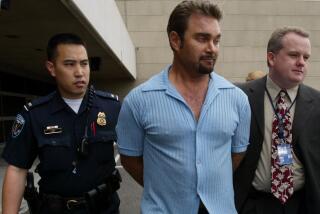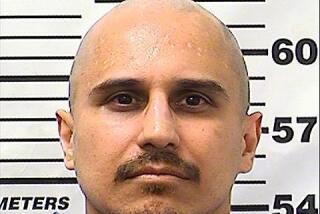Convicted rapist Luster testifies he’s a victim of bad legal advice
Testifying in a blue prison jumpsuit with his ankles chained, Andrew Luster cast himself Wednesday as a victim of tragically bad legal advice.
Serving a 124-year sentence on rape and drug charges, Luster, the great-grandson of cosmetics giant Max Factor, took the witness stand in Ventura County Superior Court, where he hopes to have his unusually long sentence reduced because his legal representation was allegedly inept.
With drawn face and sometimes terse answers, Luster said attorney Richard G. Sherman urged him to flee to Mexico — advice Luster followed a week into his 2002 trial. The legal system in Ventura County was stacked against him, Sherman allegedly told him, and in prison, the wealthy, handsome Luster was likely to be murdered.
“I was traumatized,” Luster said. “I was completely scared out of my wits.”
After he jumped his $1-million bail, Luster was convicted in absentia of giving three women the powerful anesthetic GHB and raping them at his beachfront home. Jurors saw videotapes he made of himself committing sexual acts on two of the unconscious women and found him guilty of 86 criminal counts, including rape by use of drugs and rape of unconscious victims.
Luster’s current attorneys, J. David Nick and Jason S. Leiderman, argue that Sherman deliberately frightened his client into fleeing so he could choreograph — and charge hefty fees for — Luster’s flight to Mexico.
A state appeals court ruled last year that Luster deserved a shot at proving his former lawyers’ incompetence.
On Wednesday, Luster testified about a string of attorneys he hired and fired before Sherman. One of them, James Blatt, advised Luster to accept a possible plea bargain that would have resulted in a prison term of eight to 12 years. But Luster said he listened instead to another lawyer, Joel Isaacson, who contended that the case would be dropped once he could tell jurors about the corruption and incompetence of Ventura County authorities.
“My head was reeling,” Luster said. “I was confused.”
Ultimately, Luster hired Roger Diamond and Sherman. As a judge continued to reject defense motions, Sherman started making suggestions about “leaving the jurisdiction,” Luster said.
In December 2002, Luster said Sherman introduced him to investigator Patrick Campbell, a “black-ops, mercenary type,” who immediately had Luster strip to ensure that he wasn’t wearing a wire. After a few more meetings, Luster said, Campbell drove him to Mexico.
Six months later, celebrity bounty hunter Duane “Dog” Chapman apprehended Luster in Puerto Vallarta. Luster was taken to Wasco State Penitentiary, where one of his first visitors was Sherman. The attorney came with a notary and papers effectively giving him Luster’s home.
Sherman died of cancer in 2011. In a 2004 Los Angeles Times interview, he denied defrauding Luster, as Luster had charged in a lawsuit. Sherman also said he “was never in a room with Mr. Luster discussing his fleeing. The only thing I discussed with him was his future.”
Ventura County Deputy Dist. Atty. Michelle Contois said Luster was free to ignore Sherman’s advice. In cross-examining him Wednesday, she tried to suggest that Luster was less than penitent.
Under questioning about the rapes, Luster told Contois that he had not “given” GHB to the women: “We did GHB together.”
Contois asked Luster whether he had once said the harm he suffered at the hands of the court system “was equal to the harm you did to your victims.”
Judge Kathryne Ann Stoltz would not allow him to answer, ruling that the question was argumentative. A retired Los Angeles judge, Stoltz hears cases when local judges are overloaded or want to avoid apparent conflicts of interest.
The hearing is expected to end Friday. If Stoltz rules that a new sentence is warranted, a separate hearing will be held, during which Luster’s victims will have a chance to testify.
More to Read
Sign up for Essential California
The most important California stories and recommendations in your inbox every morning.
You may occasionally receive promotional content from the Los Angeles Times.










